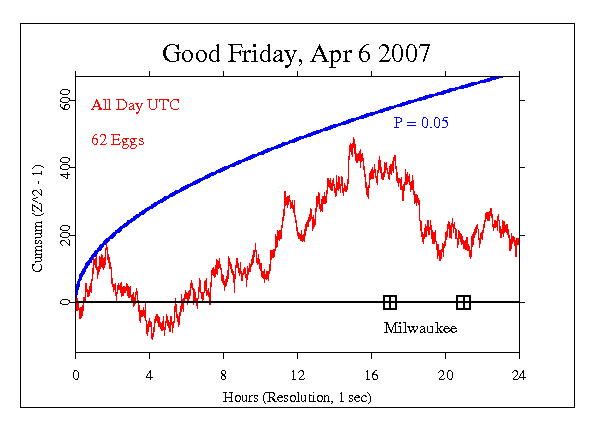|
We explore all kinds of "events" that seem to be meaningful
to large numbers of people. Nowadays, we do not make formal
predictions in cases where experience suggests the chances
of a substantial effect are small, or in cases where there
the information is not available for a precise
specification. But explorations are useful as precursors to
formal assessments of event categories. We can learn from
them if we are careful in our interpretations of results.
Here is an example suggested by a correspondent named Ellen,
who is interested in the potential collective effect of a
special time on Good Friday.
I'm wondering if you've ever taken any
special notice of Good Friday. Here's why I'm
curious: When I was a child, raised Catholic and
going to a Catholic school it was still in the days
when everything closed for the 3 hours of "the passion
and death" of JC. It was virtually impossible to not
be thinking about the historical events of the day. I
recall that as the years went by I came to expect that
no matter what the weather was in the morning on Good
Friday, by or at twelve the skies would cloud up.
Sometimes it would storm. I'm not certain it wasn't
my childish imagination that makes me think it
happened every year, but it seems to me that that was
so. Altho' I've looong not been Catholic I still
note the weather each Good Friday afternoon and it
seems that there are few years where this phenomenon
doesn't happen. Even in these times when businesses
stay open, etc. the day is still very strong in
theconsciousness of the masses. I used to think that
"God" made it happen. Now I can't help but wonder if
it isn't the focus of concentration that actually
affects our surroundings. Today's Good Friday, here
in Milwaukee, and the weather was sunny til about
11:30, cloudy til a bit after 3:00 and then sunny
again.
It is a useful exercise to do an analysis, partly to
indicate what is needed to specify a
hypothesis that can be tested. Ellen lives in Milwaukee, and
sees a confirmation of the 3 hour change. But of course
Christians live all around the world, and the 3 hour period
she describes travels through the time zones. To make a test
that corresponds to her experience, we would look at the
data collected between, say, 11:00 and 4:00 Milwaukee time,
(adding a bit on either side of the likely period)
but to test the general hypothesis as described, we would
need to look at data from many timezones. The figure shows
the 24 hour UTC day, and the segment for Ellen's experience
is marked. Because the GCP effect size is too small for
single events, even powerful ones, to show up reliably in
the data, we can't make strong interpretations. However, if
we assume this sample is representative, we see an overall
positive trend, which is impressively steady from 04:00 to 16:00.
No statistically appropriate conclusion can be drawn, but
this is consistent with a weak but widespread global consciousness effect.

|